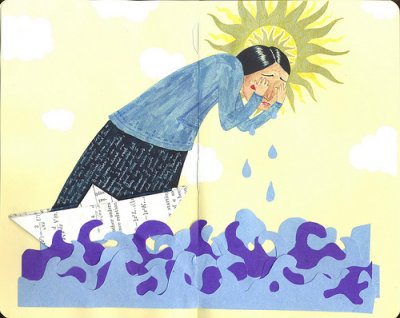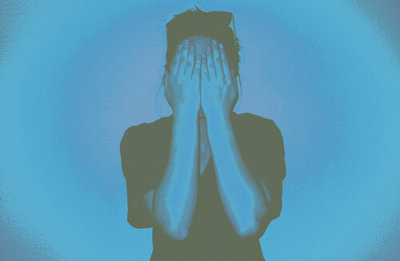Depression vs Sadness — When Should You Be Worried?

By: William Ross
Understanding the difference with depression vs sadness is actually very important.
It means you don’t neglect a serious mental condition because you think it is ‘just a bad mood’. It also means, if you really are just sad, you don’t panic.
So what is the difference between depression and sadness, and when is someone depressed enough it’s time to seek help?
[Worried you really are depressed? Take our free “stressed, depressed, or both” test now.]
What is sadness?
Sadness is an emotion that is actually a normal, necessary and healthy response to certain parts of life. We can’t avoid feeling sad now and then. And if we did not sometimes feel sad, how would we know what joy is in comparison?
Sadness helps us determine what matters to us, what we like and don’t like. And it helps us process difficult experiences like loss and failure.
If we allow ourselves to fully experience sadness, instead of ignoring it or fighting it off? And let it move through us, rather than getting stuck in it and feeling a victim? Sadness can even feel rather invigorating, like a good rainstorm coming through.
When we feel sad, we tend to know why. It will be a certain, identifiable experience or series of experiences that are behind the emotion.
And although sadness might stick around for several days or weeks, depending on its trigger, it will eventually leave.
Sadness can also come and go, such as when we are in mourning and we have sad days interspersed with feeling okay.
What is depression?

By: Lady Orlando
Depression is a state of being that is far from a healthy part of life.
It’s considered a ‘maladapative’ behaviour because it is an ineffective way to cope. It stops us from adjusting to life, or even makes our days worse.
Depression can involve sadness, but is often less energising than even feeling sad or feeling anything at all. Many suffers speak about feeling feeling numb. Depression also tends to come with physical symptoms, such as fatigue, brain fog, and a change in appetite.
When we feel depressed we can sometimes have no idea why. It can be as if depression crept up on us, or we suddenly fell into a hole. Or it can feel illogic, with a small thing happening and we feel as if it’s the end of the world.
Depression tends to be pretty consistent. We just feel down all the time, no matter how much we’d like a break, and it goes on for six weeks, several months, or even for years.
[For more on depression, read our free and comprehensive Guide to Depression.]
Depression vs sadness
Sadness is an emotion vs depression is a state of being
Sadness comes and goes vs depression is a consistent and chronic feeling
Sadness is just emotional vs depression is also physical and mental
Sadness has a concrete cause vs depression can feel illogical
Sadness lasts for days or a few weeks vs depression lasts weeks, months, or even years if not treated
Sadness can involve unhappy thoughts vs depression tends to involve really negative, dramatic, or doomsday-like thoughts
Sadness feels hard but manageable vs depression can leave you feeling entirely helpless
Sadness can leave you a bit tired vs depression can leave you unable to leave the house
We know why we are sad vs we can have no exact idea why we feel depressed.
How are sadness and depression related?

By: alexisnyal
Sadness is not honoured in our society.
There is an overemphasis on being happy and ‘positive’, made worse by social media and the competition it creates for the perfect-looking life. This kind of obsessive ‘pursuit of happiness‘ is actually a very unhealthy approach to life.
Emotions exist to be felt. And sadness has gifts for us. Again, it helps identify what we value and what we need in life.
If we repress sadness, we tend to also repress other emotions, including joy.
Over time, if sadness is always avoided and repressed, then it can build up and contribute to a case of depression. True, it might be a blend of things that cause your depression, such as a difficult upbringing, many challenging events in a row, or even a genetic disposition towards depression. But sadness can definitely be a trigger.
Not sure if you are or aren’t hiding your sadness? Look at your life to see if you might be using coping strategies to avoid your emotions. This might be drinking a bit too much, overeating, overworking, going out all the time and avoiding ever being alone, or alternately avoiding social situations that are intimate enough you’d have to let your emotions out.
So when is my sadness or depression a problem?
The main signs to look for when it comes to sadness morphing into depression include:
- If you have been feeling low for six weeks or more
- If your low moods are now consistent over erratic
- If you you have stopped doing your regular activities
- If you constantly feel bad about yourself or feel guilty all the time.
If this sounds like you, it’s a good idea to talk to a counsellor about what is bothering you.
If your low moods are now leading to doom-like thoughts that life might not be worth living or you should hurt yourself, it’s very important to reach out for support. Here in the UK the Good Samaritans have a 24-7 hotline that connects you to an understanding and trained listener — call 116 124.
Harley Therapy connects you with friendly counselling psychologists and psychotherapists who offer depression counselling. If you can’t make one of our three London locations, consider online therapy, as flexible as you are.
Still have a question about sadness vs depression, or want to share your experience of depression with other readers? Use our public comment box below.





I appreciate the information in the article.
Sadly DSM / ICD allow 2 weeks for diagnosing depression – questions about comings and goings of sadness and or bothering event/s are rarely acknowledged by practitioners by the time a person seeks assistance from medical models prescribing models of “care”.
Re-write criteria, symptoms and offer better services for people to be able to talk things through.
By the time a person realises or is talked into going for “help” they are likely to have lost some of their awareness and confidence.
This is sad.